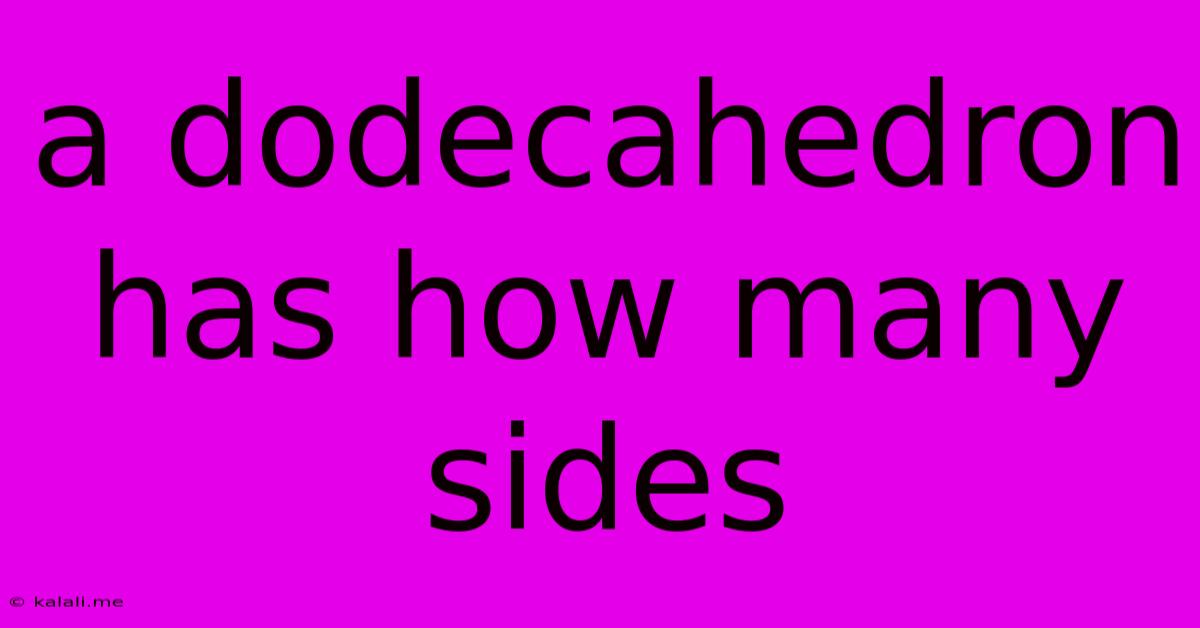A Dodecahedron Has How Many Sides
Kalali
May 09, 2025 · 2 min read

Table of Contents
A Dodecahedron: Unveiling the Number of Sides and More
A dodecahedron is a three-dimensional solid with twelve faces. But the story doesn't end there! Understanding a dodecahedron involves more than just counting its sides (or faces, as they're technically called in geometry). This article will delve into the fascinating properties of this shape, clarifying its number of faces, edges, and vertices, and exploring its place within the world of Platonic solids.
What is a Dodecahedron?
A dodecahedron is a polyhedron, meaning a three-dimensional shape with flat faces, straight edges, and sharp corners or vertices. Specifically, it's a regular dodecahedron when all its twelve faces are identical regular pentagons. Each pentagon is surrounded by five other pentagons, creating a beautifully symmetrical structure. This symmetry is a key characteristic of this fascinating shape. Understanding its structure helps us appreciate its unique properties.
How Many Sides Does a Dodecahedron Have?
The simple answer is: twelve. A dodecahedron has twelve faces, each of which is a regular pentagon. This is the defining characteristic of a dodecahedron. Remember, in geometry, "sides" refer to the faces of a three-dimensional shape.
More Than Just Sides: Edges and Vertices
Understanding a dodecahedron involves more than just its faces. Let's look at its other key components:
- Edges: A dodecahedron has 30 edges. Each edge is where two pentagonal faces meet.
- Vertices: It possesses 20 vertices. A vertex is where three pentagons come together.
These numbers aren't arbitrary; they're interconnected and follow specific geometric rules. The relationship between the faces, edges, and vertices of a dodecahedron is described by Euler's formula for polyhedra: V - E + F = 2 (where V = vertices, E = edges, and F = faces). In the case of a dodecahedron, 20 - 30 + 12 = 2, confirming its geometric consistency.
Dodecahedrons in the Real World and Beyond
While seemingly abstract, dodecahedrons appear in surprising places:
- Crystallography: Certain crystals exhibit dodecahedral structures.
- Games and Puzzles: Dodecahedrons are used in various games and puzzles, utilizing their unique symmetry.
- Art and Design: The shape’s aesthetic appeal makes it a popular motif in art and architecture.
- Mathematics and Geometry: It serves as a fundamental example in the study of polyhedra and geometry.
Dodecahedrons and Platonic Solids
The regular dodecahedron is one of the five Platonic solids. These are convex regular polyhedra, meaning all their faces are congruent regular polygons, and the same number of faces meet at each vertex. The other Platonic solids are the tetrahedron, cube, octahedron, and icosahedron. Each possesses its unique characteristics and mathematical elegance.
In conclusion, while the question of how many sides a dodecahedron has is readily answered with "twelve," understanding this shape fully requires appreciating its complete structure: its twelve faces, thirty edges, and twenty vertices. It's a testament to the beauty and complexity found within seemingly simple geometric forms.
Latest Posts
Latest Posts
-
What Is The Percentage Of 4 7
May 09, 2025
-
7 Out Of 21 As A Percentage
May 09, 2025
-
6 Pies En Metros Cuanto Es
May 09, 2025
-
Can Anxiety Cause High Red Blood Cell Count
May 09, 2025
-
Cuantos Son 48 Grados Fahrenheit En Centigrados
May 09, 2025
Related Post
Thank you for visiting our website which covers about A Dodecahedron Has How Many Sides . We hope the information provided has been useful to you. Feel free to contact us if you have any questions or need further assistance. See you next time and don't miss to bookmark.